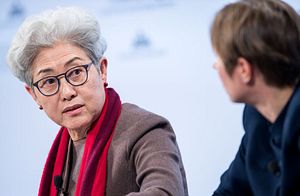The three-day Munich Security Conference (MSC) wrapped up on February 18. As many observers pointed out, the traditionally serene and rational forum, where world leaders generally look for common ground, was rife with finger-pointing this year.
The most dramatic scene, surely, was when Israeli Prime Minister Benjamin Netanyahu directly challenged Iranian Foreign Minister Javad Zarif during his speech by holding high a piece of metal, which Netanyahu claimed was a part of an Iranian drone.
Although less dramatic than Netanyahu’s presentation, German Foreign Minister Sigmar Gabriel’s criticism of China was unusually harsh, too. During his speech, he condemned China – together with Russia – for “constantly trying to test and undermine the unity of the European Union” and seeking to influence individual states with “sticks and carrots,” according to The Sydney Morning Herald. Specifically, he slammed China’s Belt and Road Initiative, claiming that China has been using a huge amount of funds to promote a value system different from the West’s.
Gabriel’s remarks were in line with the recent rising tide of “China threat” rhetoric worldwide. As The Diplomat has been following, the Trump administration in recent months has repeatedly singled China out, claiming that it (together with Russia) is a major threat to the United States.
Against the backdrop, Chinese senior diplomat Fu Ying’s task was to present a pleasant image both for China and for herself at the MSC. In sharp contrast to some foreign leaders, Fu, chair of the Foreign Affairs Committee of the Chinese National People’s Congress, chose a soft tone to make China’s voice heard by the West.
Ahead of the MSC, Fu had written a signed article for a special edition of German Times pegged to the MSC. In the article, Fu maintained that “China is not interested in the so-called ‘competition of systems’.”
In response to the West’s fear of China’s attempts to export its development model, Fu wrote, “We wish to play a role in world affairs and make an even greater contribution to mankind…but this does not mean that China’s model and ideology are to be exported.”
During the MSC itself, Fu joined a panel discussion about nuclear security. In her speech, she reiterated China’s “no first use” principle, saying that “under no circumstances will China use or threaten to use nuclear weapons against non-nuclear-weapon states or nuclear-weapon-free zones.”
This remark apparently was an answer to the recent U.S. Department of Defense’s Nuclear Posture Review, which claimed that China’s nuclear strength is a threat to U.S. interests in Asia.
On the North Korea issue, Fu held China’s stance, saying that “China does not have the magic tool” to rein in Pyongyang, though she also emphasized that China was doing all it can.
In fact, Fu’s remarks during the MSC were nothing new; she was in complete conformity with China’s line on foreign policy. What’s remarkable about Fu, though, is that she has always been able to express China’s positions in an approachable and reasonable manner, rather than an aggressive one.
As the Financial Times noted, Fu is “a rare specimen in the ranks of Chinese diplomacy.” Besides being a woman and an ethnic minority, both of which are rarities in the upper echelons of Chinese politics, she is one of the few Chinese diplomats who dares to use her own words instead of rigid diplomatic wording at international events. Fu once said that in public diplomacy, a diplomat should “speak early, talk more, and explain clearly.” Fu has also been active in explaining China’s position to the world through foreign media and foreign think tanks rather than China’s national channels (for example, Fu wrote a piece on China’s vision for the world that was published in The Diplomat).
Fu’s soft diplomacy has made many foreign leaders willing to talk to her personally. For example, as The Diplomat reported previously, South Korean Foreign Minister Kang Kyung-wha chose to have a luncheon with Fu before Kang met with her Chinese counterpart Wang Yi in late December 2017.

































